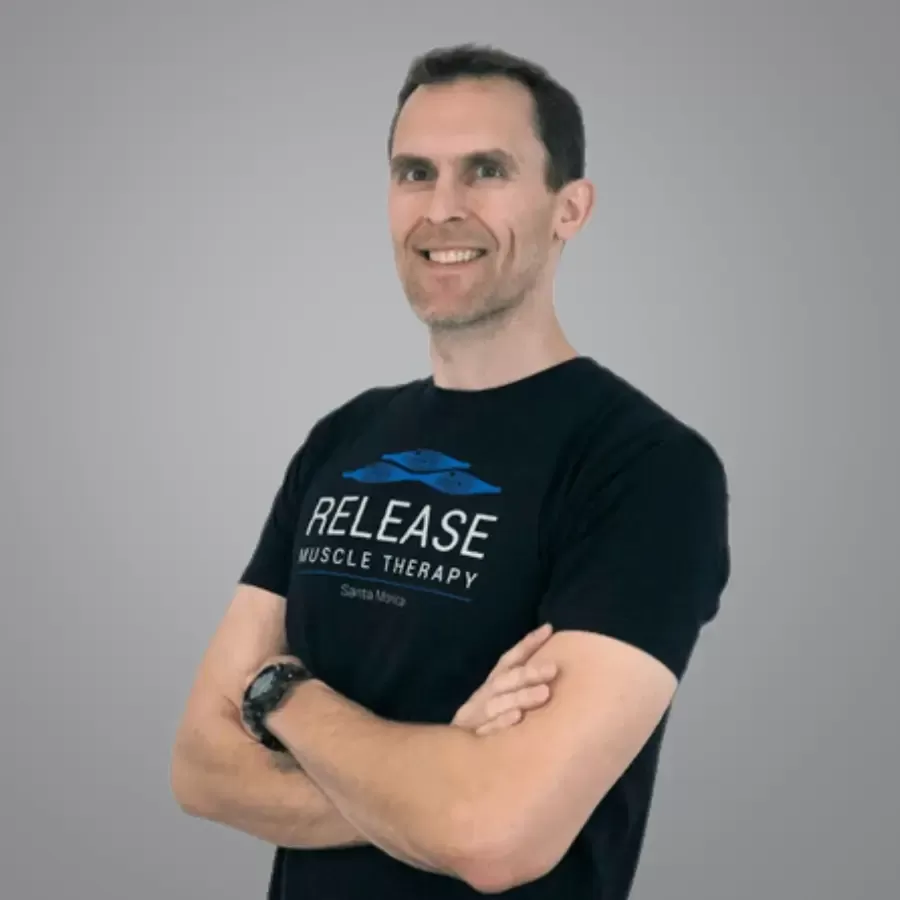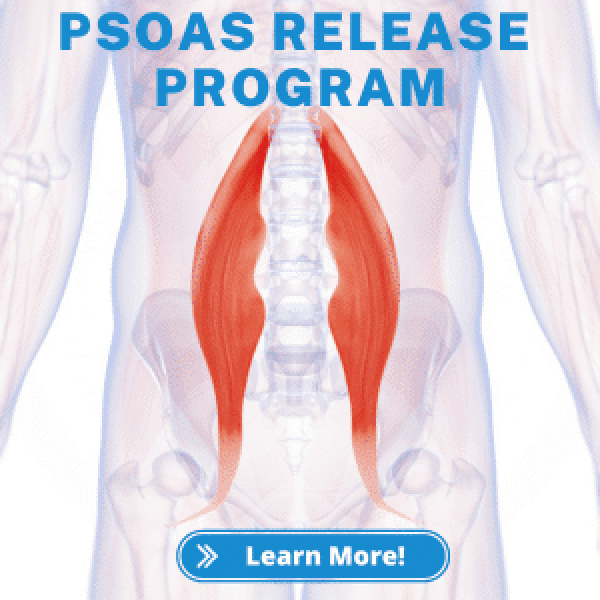Gut Directed Hypnotherapy Interview w Lindsey House RD

Lyndsey House RD (00:01):
I am thrilled to introduce back with us today on direction, not perfection. Sam Visnic, owner of Release Muscle Therapy. Sam has studied dozens of systems and methodologies for uncovering the root causes of aches and pains, and along with postural and movement issues, pain, science, the art and science of hands on soft tissue, massage techniques, myofascial release coaching movement, how that’s essential. And so excited to get more of your wisdom today. Welcome back, Sam.
Sam Visnic (00:32):
Thank you so much for having me. Great to be here again.
Lyndsey House RD (00:35):
Yes. So in case any of our listeners love you today, and they will, they can go back and listen to episode 1 58 where we really honed in on chronic pain and why didn’t my doctor tell me that? It’s one of my favorite episodes, and I’m not just saying that cuz you’re with me today, <laugh>.
Sam Visnic (00:53):
Thank you. I’ve always referenced that now when people say, Well, can you send me more information about your work? Or whatever, It’s the absolute best podcast example, I think. And it was such a great discussion.
Lyndsey House RD (01:04):
Oh, yay. That’s awesome. And today we get this whole new topic, which I shouldn’t say whole new. I’ve had psychologists come on and talk about hypnotherapy before, and I feel like my brain can kind of grasp it from a past trauma or even changing of behaviors. And we get to speak with you today on all of your science and studies of how it really comes in with chronic pain and, and more of your business. So can you set us up for what to expect today?
Sam Visnic (01:36):
Well, there’s a, there’s a lot of different ways and approaches to discuss topics like hypnotherapy, and it is this bizarre topic that it, it’s very not well understood. Even most scientists have a hard time describing the definition of what hypnosis is. So within the field of evidence in research and so forth and science, it’s challenging to discuss. And that’s not even looking at how the general public views this topic, which is much more different. And in particular, the exposure to hypnosis as a topic is mostly the stuff that we see on television and stage hypnosis and so forth. So there’s, there’s a lot of misinformation about this topic, and I, I hope to clear that up and to, to give you the, the what’s what when it comes to hypnosis and how incredibly effective as a tool it is and how popular it is becoming in scientific communities.
Lyndsey House RD (02:31):
It’s interesting that you mentioned the <laugh>, the stage type hypnotherapy, and that’s so real. I think people see hypnotherapy as very fluffy, very, it’s a performance and man to have to backtrack from that for individuals to, to backed out of that thinking, just to start at the beginning of trying to help people understand its benefits. Is that a bit frustrating?
Sam Visnic (02:58):
It is a little bit, and, and I think in particular, it’s not, you know, everything could be used for, for fun and the, you know, human perception is so malleable, you know, in how we interrupt people’s thought processes and their behaviors and get them to do different things and to influence, That’s all fun stuff to play with. But it’s important to understand and to segment, you know, things like fun, entertainment based hypnotherapy, or I’m sure I don’t wanna use that word, hypnosis as being something that people willingly engage in, and it’s something that they’re doing with the intention in that context of, of having fun. Stage hypnosis is meant to, in particular lots of different styles with it is very much akin to doing a magic show. When you, when the, the magician wants to select somebody from the audience, there’s certain parameters that they’re gonna use, they’re gonna look out into the crowd and look at the person that’s the most engaging into the process and looks like they’re willing to participate.
(03:54):
They are going to select that person to come up on stage, and they’re gonna have much more bombastic responses from the person because they wanna engage and have fun with the show. And that’s kind of how, how stage hypnosis works. It’s, you know, you can’t make somebody do something, and we’ll talk about this a lot, like, you know, you know, flap their arms like a chicken and bark like a dog unless they’re willing to do it. And so that’s the part I think that people don’t understand. Then first and foremost, you have to clean out from the idea of, of hypnosis is somehow that mind control can occur. And that’s absolute nonsense. People have to be a willing participant in order for one person to influence somebody to do something that’s abnormal, that’s outside of their values and their moral code and their ethics.
(04:38):
And I think that’s the thing that a, right away separates these two things when people go, Oh, really? So that’s not possible. That is correct. It is not possible. And the frustrating thing for me is more like on one of the major podcasts kind of at the Joe Rogan level ish mm-hmm. <Affirmative>, there was a hypnotherapist who went on to this show and actually started making these types of claims as saying, you know, he influenced people to do essentially ridiculous things and, and somewhat immoral things just to to trick coworkers and to do all of these things. And the way that he was expressing this was my problem and saying, Wow, you’re, you’re not doing this field any good. You’re doing it damage by making people a huge audience of people, huge audience, and trying to at the same time build credibility to the field of hypnotherapy while simultaneously making these types of statements as utter hogwash. It’s very disappointing to hear that sort of thing.
Lyndsey House RD (05:35):
Absolutely. It only takes a couple and all of a sudden our battling back on the good of it is so hard. Yes,
Sam Visnic (05:42):
Absolutely. Absolutely.
Lyndsey House RD (05:44):
Yeah. Thank you. That was so well said. I kind of wanted to point this out too, because in my head, this is new to you and like you’ve gained some, some inspiration or passion behind it. And then I was looking back through your podcast bio and it’s actually a question that’s been on there for years. Like, have you actually been practicing this for years and you’re just trying to really hone in on it a little bit more? Or have you gained some momentum behind it?
Sam Visnic (06:08):
Well, hypnosis is, and this is something that’s kind of a challenge, is that there are people whose primary focus is hypnotherapy. That is what they do. You come in, sit in a chair, and then you go through this kind of coaching based process. Now that is one way of doing it, but it, it is a limited scope of understanding the hypnotic phenomenon and which we’ll talk about. But hypnosis is really a, a idea of essentially looking at a current circumstance or state of consciousness or set of behaviors in conditions that an individual has that contextually is for the most part we think about is giving them problems. So if they have pain, they have back pain or they have neck pain or something like that. And the outcome is to interrupt that process to throw a wrench in the wheel, so to speak, and to give their nervous system a new way to do operations in a way that doesn’t cause problems and to set forth those new behaviors so that the issue doesn’t come back.
(07:08):
So if you think about it in that regard, hypnosis is simply a set of tools and techniques to accomplish that same outcome. So whereas it’s classically thought of, of sitting in the chair and being hypnotized, that’s not the way it has to be carried out. When we consider that in conversation, because we’re using language, language itself can carry forth hypnotic outcomes and processes just by the way that we communicate. So I would say that my first training in hypnosis and hypnotherapy was almost probably about 18 years ago. So to say that I haven’t been using hypnosis because I haven’t been sitting across from people doing it in that way. No, that’s not true at all. And that’s one of the, again, fundamental misunderstandings we have about hypnosis and the process. So I’ve been using it for a long time, but what happened is, is that there’s been a lot of advancement in, I think maybe not so much in the value of hypnosis, because hypnosis has been effective for a long time as we’ll talk about in particular using hypnosis and hypnotherapy.
(08:12):
I think the first study came out in the mid eighties on ibs and it was a successful study. Nobody talked about it, but after a few decades, now we have more advances in technology that are lending the scientific mind to move into the direction of trying to study these phenomenon and what is occurring. One of the big advances is brain MRIs, functional brain MRIs, and looking at what’s going on with the brain while people are in states of hypnosis. And they’re starting to find that there’s some real meaningful changes that are occurring here. And now it’s, it’s just kind of hitting more of the mainstream of having an evidence based backing behind it. So now is kind of the time that I’ve found is, you know, maybe it’s time as people are more receptive to this to start, you know, educating more on this topic. And there’s certainly a lot of different ways that I can assist people with using hypnosis services when they’re already getting good therapy and good coaching and so forth, but they’re missing this one element so I can help them fill in the gap.
Lyndsey House RD (09:14):
Okay. I think it would be super helpful for our listeners to hear a case study, someone walks in your door, they are fighting X, Y, Z, and you have this treatment option plan. Can you kind of walk us through what that would look like?
Sam Visnic (09:28):
Yeah, everything starts off with individualization, right? So people come in the door and oftentimes in, in my world, they’ve been to multiple practitioners and they’ve done a lot of different things. And I have nothing wrong with that. You know, somebody comes in with a back issue or, you know, a digestive issue, they’re gonna see an assortment of practitioners and carry out some basic things. So say somebody’s been to a chiropractor, they’ve been nutritionist, they’ve done some, I’ve cleaned up my diet, I have started exercising or whatever, and I’m not getting the results that I wanted. I’m still having this issue. So you’re always gonna look at that and say, Well, what are the conditions by which this issue exists? Is it something that happens when you’re sitting at your desk and you’re working or is it something that happens when you’re off riding a bike and your back hurts?
(10:17):
There’s always these conditions that cause the issue to come forth. So you have to do an evaluation of that. A lot of questions to try to understand how this exists. And rightly so, most people have never been asked these questions before and can oftentimes find it little challenging to answer these questions. Sometimes there are things that they know very well, Oh, it always happens when I do this. But other times they say, I don’t know, it just seems to occur. So you have to actually define the problem space and understand the components around it. Not all of those answers are gonna come out on the first session. Sometimes it takes some guided questions to ask somebody to say, I want you to, you know, grab a journal and pay attention and write these things down. And that might be able to help people find some of the contextual elements that cause their, their issue to come up.
(11:05):
So once you do that we identify the sticking factors and so forth, and a lot of times, let’s say moving this into the direction of what we would find with gut directed hypnotherapy and individuals who are dealing with gut issues, we always end up finding if we could just put a big label on this, a contributing factor of stress, of some kind of stress. Maybe it’s an environmental stressor or a work stressor or something the person is having to constantly cope with or interact with. And it seems to be related to an increase in their symptoms. So that would, once we define that, that might be an issue that we would go after, is teaching them how to deal with that stress in a way where we can interrupt it, where we can get symptomatic relief.
Lyndsey House RD (11:51):
Interesting. Okay. And getting the symptomatic relief through interrupting, we’re talking about hypnosis at this moment. Is that where we’re going with this?
Sam Visnic (12:01):
Yeah, and I, the best way of, you know, saying, and overall what we’re trying to do is a problem that is well defined is 50% salt. So at the first, you know, session, we’re trying to gather lots of information about how this is all affecting things. And once you identify the problem, and a lot of times it kind of distills down into this is what I’m feeling and I don’t wanna feel this way and this is what I want to feel instead. And I don’t know how to feel that in this context. And that way we would at that point introduce hypnosis techniques to assist the person in actually doing that mechanical process of getting their nervous system to, to reduce or to open up that space where they’re feeling the way they don’t wanna feel and exchange the feelings of what they wanna feel instead. I know that’s a lot, that it’s kind of like almost fundamentally no different than somebody saying walking in the door and saying, My back is really tense. I would like my back to not feel tense. I’d like it to feel relaxed, but they don’t really know how to consciously do that. So the massage therapist or the chiropractor, whatever, would employ techniques to make that outcome happen.
Lyndsey House RD (13:13):
Right? Do you ever pair this or are they sitting across from you? Or is this paired with another form of therapy that’s going on, like massage therapy plus this?
Sam Visnic (13:24):
It can be, And that’s the cool thing. So I think that one of the challenges is with any technique is that we know that human beings are very capable of doing the things that we want them to do. So for example, if you’re dealing with ibs, it is very possible, very possible. And because everybody can do it, that you can employ relaxation techniques or use your brain in a way to directly calm your gut down. Now the challenge is if you have no idea that that is even possible or remotely how to do this, we’re going to have to give you an experience of it occurring. So the, that is walking through those processes or teaching people how to do things and sometimes verbally talking about them is not going to get the job done. So it can be done in a state of hypnosis or through some other technique.
(14:14):
If I were to do a massage technique by putting my hands in and giving somebody a form of mechanical stimulation pushing into the tissue, and then I say, Now breathe. And then every time you exhale, just relax and let me know if that pressure feels more tolerable. And they say, Well, yeah, it’s getting better. That’s an exact example of a feedback loop that lets you know you are capable of relaxing against that stimuli. Now when we teach people that they say, Okay, that’s what it’s supposed to feel like, then it’s far easier to progress the techniques forward to utilizing them in their day. So it’s kind of like a practice, practice session also for learning how to modulate your own nervous system under different circumstances.
Lyndsey House RD (14:58):
Thank you. That example was that hugely helpful. So they can walk out of your office or even, and I wanna talk about this, if it could be a virtual session or if it does need to be in person, but they’re going to keep implementing something that they have just been taught over and over until the relief comes. Am I hearing that correctly?
Sam Visnic (15:18):
Yes. And learn human hypnosis is a lot about learning and about skill development. The idea that the hypno therapist, just like any other type of therapist, is, is what you need to do. The work to you is very limiting. The job of the hypnotherapist is to open up that doorway for learning and understanding and to assist you with having that experience so that you can learn to replicate it yourself. Just like anything else with human beings, we are learning machines, and when we develop certain behaviors and subconscious responses, it kind of drops into the outside of awareness. So therefore it has become kind of a neuro pattern, right? So when we want to change a behavior, sometimes just like a lot of different therapies, you can do a one hit wonder, you can do it once, and the problem never seems to come back. I’ve had many cases of that over the years back, problems, gut issues, all sorts of things.
(16:17):
But we don’t wanna set that expectation that that happens every time. So what we wanna do is to teach people the skills to say, as you go back to your environment, if this pattern continues to play, we’re gonna teach you two skills. Number one, how to interrupt it when it is happening so that you can change something. But also important is how do you prevent the pattern from starting to begin with. So if you can change it from even turning on that facilitated pathway, that is phenomenal, but also if it does happen, it’s not the end of the world because we’re gonna give you some techniques to interrupt it so that we can essentially metaphorically scratch the record so the record can’t play the same way over and over again.
Lyndsey House RD (17:04):
I like this. Okay, so I’m picturing like highly stressed individual who they can tell it’s their stress and then immediate IBS issues throughout their day. They’re coming to you for reprieve out of this, but one, what if they don’t believe that this is even like a thing or they don’t believe that it can help? And and for the person who is like, they can barely settle into their own skin for a minute, to really listen to what you’re saying. Like are there levels of where you’re like, Okay, we have to at least get you to here before we’re even gonna be able to shift you to phase whatever?
Sam Visnic (17:41):
Well, the, the, the research on this part is very interesting because when you look at what the research says, and there’s been many studies on this now, and obviously a lot more in development on gut directed hypnotherapy, is that many of the participants, I think as high as 50 to 60% were very skeptical of, of hypnosis before they, they walked in the door to, to participate mm-hmm. <Affirmative>. And the funny part is, is that it had no effect on the outcome. Meaning that almost all of them had the same positive response afterward, and their skepticism of hypnotherapy dropped dramatically. <Laugh>. So we know now that part of hypnosis is because the, the question always comes up is the is hypnotherapy versus placebo, and these are not the same thing. They’re fundamentally different processes. So hypnosis is not a placebo effect. I’m sure just with any therapy there is placebo involved, but there is an actual change that can be measured in the brain as a result of doing hypnotherapy.
(18:41):
So there are things that are occurring. So when people come in with the skepticism, it’s usually because of the stuff like we talked about at the beginning of the interview, they do not understand what this is. And if they’re under the assumption that this is somehow just manipulation or it’s just placebo, they’re going to be a bit more resistant. And just with any other therapy this is something where I have the conversation with peoples to say, in order to achieve a benefit out of something you really need to be willing to play, You know, you need to play full speed. What is the point in going to a hypnotherapist with the intention of saying, You can’t hypnotize me? Why would you want to say that? Because if the outcome is, I don’t think I’m hypnotizable, but you know, feel free to try, I’m willing to play.
(19:29):
That is the goal. And people will say this, and in the studies, you, you see suggestibility scales and the degree that people can be hypnotized, none of that makes any difference. And that is based upon this misunderstanding of what hypnotherapy or hypnosis really is. Human beings are in hypnosis all the time. And to say that an individual can’t be hypnotized is about the same as saying you can’t go to the movie theater when a movie that you wanna see comes on and be fully immersed in the movie. Everybody can do that. It’s just a matter of whether or not the movie that you’re watching is interesting to you or not, you know? So none of these things are, are are things that really get in the way of the fact that hypnotherapy therapy actually works other than the person’s skepticism and, and resistance to actually participating.
Lyndsey House RD (20:22):
Right. I liked this, I wrote this down, we need to play it full speed and Yep. I, I wanna like highlight that and pause for our listeners to just go, hang on a second. Do I walk into, whether that’s doctor’s appointments or therapy sessions, or am I ready to play at full speed or am I always coming in wanting that other person to have to prove themselves or prove that it’s gonna work? Like what if I come in with all of those expectations? Thank you. That was a great way to put that. And I, this has been explained to me this way, and tell me if you agree kind of to your point of the hypno hypnosis at different levels like that we’ve all, if we can all picture we’ve driven somewhere and not really remembered how we got there because we’re just so used to driving to that place that that’s a form of hypnosis in itself that maybe all of us can relate to to some extent. Do you agree with that?
Sam Visnic (21:21):
Yeah. And the same thing is the movie theater. What what occurs is, and let me give you the definition that comes from the Mayo Clinic and we’ll, we’ll, we’ll talk real quick about why this is so confusing. Hypnosis has referred to as hypnotherapy or hypnotic suggestion is a trans like state in which you have heightened focus and concentration. Mm-Hmm. <affirmative>. Now that statement right there is erroneous. So hypnosis is not a state, okay? Hypnosis is a process by which you go from one state to another. So another way to explain this is is that the, the moment between when you’re awake and when you fall asleep, you go through a transition somewhere and that transition is hypnotic. It’s a state that kind of exists as the inter between that you move through. So hypnosis itself is almost like a system or a process or techniques.
(22:15):
And the outcome is to use these various techniques to make that transition happen with some degree of intention or purpose. So you’re doing it on purpose. So the way that that’s described, a trans like state in which you have heightened focus and concentration, a state of focus and concentration is a state not unlike being in a state of anger, right? So to defining hypnosis as a specific state of, you know, focus, concentration, anger, anything is not true focus. You could say being in a hypnotic like state is being in an intense state of focus and concentration on something probably is a bit more accurate. So, but you’re right in what you’re saying is that when somebody isn’t in a state of hypnosis, let’s say with this, you know, they come in and we might induce a state of relaxation, you know, the outcome is to have somebody immersed in some type of internal experience or focusing on something in a way where they’re less, they’re paying less attention to other stimuli. That is kind of in essence what we think about hypnosis can do.
Lyndsey House RD (23:25):
Okay. Someone’s loving listening to you right now going, I wish Sam lived <laugh> 10 miles down the street from me. I know he doesn’t. Two questions behind that. Are other practitioners jumping on board with this? Could you almost pick people out in every state or county who can do what you’re doing? Or are you pretty unique to this? And then my other question would’ve been like, do you take people on virtually?
Sam Visnic (23:50):
Yeah, I’d say first and foremost there are, there are quite a bit of, of hypnosis based practitioners skill level can vary dramatically. So that’s kind of the bad news. But the good news is, is that hypnosis seems to be quite universally effective. Again, even at basic levels, you know, being able to use a, a hypnotic induction with somebody to assist them with relaxation as long as the person is a willing participant as we talked about. So what I looked at very interestingly is that I’ve done more advanced hypnosis trainings and the complexity that’s involved in, in being just a very, very advanced skill hypnotherapist is a immense there are some really, really skilled hypno therapists. And then what we find is when I looked at the literature on pain and using hypnotherapy for chronic pain, when I read through the scripts that were highly, highly effective in the research, they were so basic, it blew my mind almost to the point where I’m reading them and I’m like, that’s what they did.
(24:51):
And that worked. I just didn’t feel com it didn’t feel complex enough, if you know what I’m saying. And it was very effective and I was like, Wow, you know, I must be working too hard. But that’s kind of what you get with this is that I think for most people the good news is, is that hypnosis can oftentimes be like pizza, even when it’s bad, it’s good and it will still work. So you wanna find practitioners that have a good amount of experience with it, but I think it’s far more important to work with practitioners who have experience in the type of problem that you want to have. So as a general, I wouldn’t take for example as a hypnotherapist, somebody that comes in and says, I wanna stop smoking, I wouldn’t do that. I mean, well generally I’d know hypnotherapy and I can assist people with changing behaviors.
(25:39):
I’m not a specialist within all of the things of understanding how people or what contributes to people smoking and you know, how to get them to stop specifically. So you can use general trans work to do that and you might very well be successful with a good number of people, but I really believe that you should be a specialist in, in that area. So my specialty with hypnotherapy is with individuals suffering from chronic pain because I understand the scope and the depth of dealing with chronic pain and also gut directed hypnotherapy, which in essence is the same thing. The brain is interpreting the information from the gut as almost being a painful type of stimuli and it is responding that way. So my specialty, and that’s why it’s, it’s very much conjoined there is gut directed hypnotherapy with chronic pain because they’re in essence the same kind of of story that’s going on in there. So I think that that piece is probably the most critical. Number one, finding a hypnotherapist with some experience obviously, but also some experience with focus in the area of the issue that you’re trained to solve.
Lyndsey House RD (26:47):
So I do feel like gut digestive issues has a, a big, it’s a big movement going on with all of that at the moment. Like we’re a lot of microbiome talk, a lot of food sensitivity testing, all of that. When we talk about this, you always, pain always comes out. So really the person has to be experiencing some level of pain, not just like bloating or not just, you know, off bowel movements. Like does there need to be a level of pain where you’re like, Now I can participate in help in this?
Sam Visnic (27:22):
Not exactly. I mean, I think that there’s a, there’s a common thread with individuals who have ibs that gut pain and discomfort is probably one of the top symptoms that they experience. But there’s also a lot of other issues associated with that. Generally speaking, the research shows that gut directed hypnotherapy has been highly effective for some things that you might not think motility issues has been a big one. There was actually some studies that showed that hypnotherapy was able to increase gastric acid secretion or lowering, so you could actually increase or decrease stomach acid levels with hypnosis, which is very interesting. And all of the things that essentially affect, like essentially you have to think about, we talk about the gut as being the second brain, so it’s just very sensitive to our e emotions and so forth. So when we’re stressed, we go into that state of fight or flight and fight or flight has changes in our gut and what our gut is in a state to do.
(28:19):
So if we’re stressed and then we get tightening and so, so forth and we get digestive issues, then hypnosis is gonna be effective with that because it’s calming the parts of the brain that are in a state of fight or flight and you’re seeing a reflection of that status in the GI tract. So everything you can imagine that we’re trying to do with nutritional approaches, which is to gut get the gut to calm, to get the gut to be less reactive, to get the immune system to be less reactive, is what we’re trying to accomplish with hypnosis work as well. But just through a different mechanism.
Lyndsey House RD (28:53):
Right? And what I’m picturing with this, I think the hardest thing about the gut is sometimes we don’t get the, like a fast visual, it’s getting better, you know, and until we can see internally or until we can really measure, which would take a lot of insight like I am feeling less bloated or I am feeling less discomfort, bowels are better, all of that, that they’d have to stick with it, right? Like a, again, just setting people’s expectations around. It’s not a one and done if it is hooray for you, but for, for most people you gotta like trust in the process and keep going and then you will see,
Sam Visnic (29:29):
Well this is the amazing thing with hypnotherapy is that the amount of volume of sessions that are necessary, it could be as little as two and then the research has gone up to about 12 weeks. So these sessions were done front loaded, but I think the lion’s share of the work a lot of times were within the first four to five visits. Then after that the sessions were spaced out and as long as the individual was doing some of their homework and was sticking with it and applying the techniques, the results had been frankly spectacular. And in particular the long term value. Because the big question is with the, especially with these refractory cases of IBS that just don’t respond to anything is this something that will last over the long run? And the answer to that is yes. Amazingly some of these patients received as much as 50 to 60% relief from their symptoms and it lasted in the long run. So, and the recommendations, and there hasn’t been that much research on this, is that over time many authors do suggest that follow up sessions and refreshers might be very helpful because this is a long term condition. But it was amazingly this short intervention of just getting a bundle of visits in and addressing this issue had such number one profound effects. And number two, it lasted for a long time.
Lyndsey House RD (30:49):
Very cool. I love that you always, throughout research, I just feel like for any of our medical professionals tuning in right now, can we use that word evidence based again and just one more time highlight the fact that this like truly is evidence-based?
Sam Visnic (31:04):
Yeah, it is. And there’s a lot to it right now. All you have to do is look up gut directed hypnotherapy online. Number one, you’ll probably end up finding, you know, a lot of medical sites and research right now. And we should link to the study that we had thrown out there. There’s a couple of them that I have, I have a huge file of all of the evidence-based literature on, on, on hypnotherapy. If you read through this and you’re not highly convinced that this is where everything is going, you’re not paying attention. I find that in, in most health practices. The challenge is even when we say we’re being evidence-based, a lot of times we’re not following what the evidence shows and the evidence shows that hypnotherapy works, number one for the primary reason why is because it’s non-invasive. We’re not even touching somebody.
(31:48):
Two, the side effects are virtually nil. The only times where hypnotherapy might be problematic is for individual with psychiatric conditions, which we need to be mindful of. And they need to be treated oftentimes with hypnotherapy by a psychotherapist who can also handle those COC conditions. There’s, there’s no risk and it’s highly effective and relatively cost efficient, especially when you consider healthcare costs that are associated with managing these functional gastrointestinal disorders. So everything about it just makes a hundred percent sense. It is evidence-based, why aren’t we doing it? And number one, because just education not knowing. And two, having availability and working with practitioners who actually can do that work. I’d say 99% of the time as I do outreach and I talk to nutritionist and clinicians and so forth, they say, Well, I’ve read that research, it’s very impressive. I have absolutely nobody to send this work to.
Lyndsey House RD (32:44):
Yeah, I could see that. That’s where I feel so fortunate to even be sitting across the, the mic from you right now to be like, I have the resource whether or not I can get you past Sam, he could get you to the next one. But I think that’s the beauty of podcasting in general is my little resource library is growing and I think it’s such a amazing thing and I’m sure you do too as a practitioner to be able to be like, I don’t know if I can help you in this area, but I know who can. And it just brings me a lot of comfort and joy to be able to refer. I love referrals and, and the people who are good at doing what they do are easy, ready to refer out when they know it’s not in their wheelhouse or somebody else can do it, you know, more efficiently or better, but
Sam Visnic (33:32):
Well, and we all have those stumbling blocks or those, those issues with people that are like, this is what we do really well. You know, one of the things that the somebody that I had learned from who talked about this a lot is says, Can you imagine the patient load by gastroenterologists of these refractory cases of IBS that they can do nothing for? The medications don’t work for them. They’re constantly getting calls in, you know, having setbacks and the doc and saying, Doctor, do something. And they say, I have no tools for you. There’s nothing that I can do that is at I’m, we’re at the end of the rope here in terms of, of options and, but yet now hypnotherapy can be in there yet, you know, et cetera. So there really is this opportunity for everybody to get on board with something that will help these patients.
(34:16):
A lot of individuals with IBS needs some medication management. Absolutely. They also need to be working closely and predominantly with a nutritionist because that’s the, the person who’s gonna help them the most in their day to day, which is, you know, whether that’s low FODMAP or a CBO program or whatever it is that they’re doing long term. And then they should be working on gut directed hypnotherapy as well. And it creates a perfect little vacuum of, of interdisciplinary support for these, for these types of issues. So, and, and one thing I would throw out there, we’re talking about this, I do not recommend doing gut directed hypnotherapy without working with those other two practitioners that I just met. You wanna have good results. Gut directed hypnotherapy does not fix ibs. It is an interdisciplinary multi support system that works together. Now, the research that we just talked about looks at comparing fo lo FODMAP diet, which is oftentimes the go-to for managing IBS and CBO symptoms. And it works in hypnotherapy done by itself rd the exact same results. And I think there were a couple of studies that showed the hypnotherapy patients that six weeks had better results. But we don’t wanna make that into a only do this therapy or that, I think that’s a bad idea. What we wanna do is imagine what happens when you are, your medications are properly being managed. You’re on a low FODMAP diet or equivalent or whatever’s working for you and you’re doing gut directed hypnotherapy. Now we’re talking the magic.
Lyndsey House RD (35:49):
Yes. And I love that you’re pointing this out. I feel this way all the time, and I probably told you this last time we talked, but I have a client who kind of named hers a dream team of professionals that she works with. And I always think if we could all build our own specific dream team around what our issue is or what we’re really trying to accomplish. And I think about this with planner fasciitis, you know, for me as a dietician and personal trainer, I get a lot of individuals who a wanna lose some weight. You know, a lot of weight management talk, a lot of getting good momentum going and then, and then this barrier of oh my gosh, my foot’s so my heel’s so inflam that I can’t walk anymore. I can’t. And then to be able to pull in both the physical therapists as well as massage therapists. Like I, I have the teams all the time working with one client and I can’t imagine not having that interdisciplinary team. And a lot of times it’s nurse practitioner to your point of meds physician, it’s all of it. And not that we use everyone all in one moment, not all in the same week, not all in the same month, but it’s being able to know exactly who we’re gonna pull from in the, in the moment that we need them. So thank you for coming at it in your direction too.
Sam Visnic (37:04):
Exactly. And I think that, you know, the more there’s, there’s all of those elements are being taken care of, the less ultimate sessions and so forth you need like my program is, is generally speaking about three visits cuz that they find that that’s generally what people need. Now they could do more, they may not need to do more depending on what else they’re doing. I just had somebody the other day who was dealing with immune system issues and he had chronic pain but I, you know, of course looking under the hood, I find that we’re dealing with sleep apnea issues and he’s has a c pap cannot wear his C pap because it’s so obnoxious and it wake him up because it feels like a tornado going down his throat. So I had to stop what we were doing, send him to a dentist who would make a mouth appliance for him to move his jaw forward so he could wear that C pap. Now I know that that guy’s gonna come back and he is gonna feel 10 times better within a few weeks and his pain levels and his tolerance levels are gonna be better and we’ll resume the work. But how he not do that, I could spend the next three, four months with him doing micro progressions of exercises because he can’t get the rest that he needs. And he’s so sensitive to any new introduction of exercises. That’s exactly how this should work.
Lyndsey House RD (38:22):
Exactly. And you’re debunking the whole theory when people are like, ah, they just want more sessions cuz it’s more money. And I’m like, ah, no <laugh>, maybe, maybe this very small percentage is out there doing it that way. But like, you’re such a good point. No, I stop my treatment until my client’s ready to come in and we can get optimal success out of
Sam Visnic (38:44):
It. Seeing miracles is awesome. Yes. I’d rather see those.
Lyndsey House RD (38:48):
Right, a hundred percent. So where can people contact you to, and I’m, I feel like I ask this and I keep interrupting you. Do you do virtual gut, gut hypnosis type sessions? Or is that really just for the person walking through your doors?
Sam Visnic (39:07):
No, and actually the the interesting thing out of this is that I used to to be very anti virtual stuff, right? Because I think that having people in person made a bigger difference. I’m actually changing my opinion on that. And in hypnotherapy I’m finding the complete opposite. I’m finding that most people feel very comfortable doing zoom or virtual hypnosis for two reasons. Number one, they can be on their computer in a comfortable environment. It removes all of those elements of feeling out of control or potentially unsafe with somebody. So all of that stuff gets outta the way, even if there’s a smidgen of that, it can interrupt the process. And also a lot of additional features can be gained by doing things virtually. When you have a headset on and we’re talking virtually music can be added and so forth to enhance the hypnotic process and everything can be recorded for follow up visits as well. So there’s a lot of bonuses and with, with zoom based or virtual hypnotherapy that I’m now saying that that is the way to go. And number one, it allows anybody to access it and two, for all of those additional reasons that I talked about. So I offer them distance wise and actually very rarely actually considering this, do most of those things in in office.
Lyndsey House RD (40:22):
Oh that is so promising and I love hearing that. I think all of us who listen to podcasts don’t accidentally go, Oh, this would be really good for maybe not only me, but this person or this person. So what’s the best way for people to send links or to reach you if they want, wanna get something started like that?
Sam Visnic (40:41):
So with this kind of work, there’s a, a consultation process that’s necessary in order to understand the scope of what somebody’s doing and to see if they’re a good fit. Number one, the practitioners that they’re working with and making sure that they have a good team with them. And also to rule out certain conditions that they may need to work with a psychotherapist on with hypnosis work. So those are things that we talk about. I am not a psychotherapist, I am a hypnotherapist, which is a little different, but that process can be done through a, a brief consultation call. It’s usually about 15 minutes just to review their ca case. I oftentimes have questions to ask to find out where they’re at, to see if they’re a good candidate, cuz of course we always want the successful outcome. So good screening process on the front end and asking questions. If you’re a good candidate, then I can determine that and then we can proceed after that. So there is a space on my [email protected]. If you go up in the menu under services, you’ll see gut directed hypnotherapy. When you go to that page you can learn more information about the process and how it works and if you are interested in it, you can fill out a form there and then I’ll connect with you about scheduling a 15 minute consult and we’ll see if it’s right for you.
Lyndsey House RD (41:48):
Okay, that sounds awesome. Is there anything that I’m not asking that I should be on this?
Sam Visnic (41:53):
Well I think that for most people, I think they need to do a little bit of extra homework on this and to go and look at gut directed hypnotherapy and in particular take a look at the results and I think you’ll be immensely impressed at what’s available out there and how this is such a great option. And like I said, you have to just connect with the right practitioners who have experience with it and of course, you know, be doing all of the stuff that you need to be doing on the nutritional fronts as well. But you know, I think that once you take a look at those two items, you’ll realize where I’m going with this and why I’m, I’m steering my practice in this direction to help with this type of issue.
Lyndsey House RD (42:31):
Yeah. And I just wanna point out one more time that you fill these gaps, these hopeless gaps with hope for the people who feel like, well this is just me, I’m just gonna live in pain. This is just me. I’m just forever gonna live with gut issues. That there is this, Sam is offering this 15 minute free consultation to just let you ease in and see if it’s a good fit because quit stopping at that barrier of this is just it, this is just me cuz it’s not. And there’s always that next extra step. And I think, no, I don’t think I know, Sam, that you bring so much hope to this space, this gap of we’re not there yet. We’re not at maybe like curing, but at least finding some maintenance and peace behind some of these, these issues or diseases. So thank you for filling that gap.
Sam Visnic (43:23):
<Laugh>. Yes, there’s one thing that I’m confident at in, in human beings is their ability to learn. And if nerves can learn to do certain things, they can learn to do other things. And that’s kind of what we’re talking about is we’re saying that unless there is actually structural damage to the nerves, you know, we’re talking about a neuro behavioral problem. So you know, to say that you’re stuck with IBS and it will never change is the same thing as saying, I keep making these certain decisions or having these certain behaviors that I’ll never be able to change. And that’s just false. You just don’t know how to change them yet. And as you learn to change them, you’ll start to see the, the pathway and the door will be open for you is that not only interrupting and changing behaviors, but also changing and framing how you think about the things that are happening to you as well. And paradoxically, a lot of times when you change how you feel about your situation, it changes the situation as well. So there’s so many different avenues and ways to make these kinds of improvements that you just have to be open and and willing to, to go the path with it.
Lyndsey House RD (44:24):
Yeah. You’re so good. Thank you. And we have to add in one more time. You not only have to do all that, you have to come in and be ready to play at full speed, so you have to Thanks for joining us. Yes,
Sam Visnic (44:34):
That’s right. Anybody who says they can’t be hypnotized, well I might take that as a challenge, but yeah, <laugh>, I’m willing to go that with you, but you still have to be willing to play.
Lyndsey House RD (44:44):
I love it. Thank you so much for all your wisdom, Sam.
Sam Visnic (44:47):
Thank you for having me.
Sam Visnic
I’ve spent my life studying the fundamental aspects of human health with a focus on movement and clinical massage therapy. In a world of specialists, surgical procedures, drugs and quick fix remedies, I’m committed to finding and developing strategies that help people stuck at the “gap”. Over the last 20 years I’ve studied dozens of systems and methodologies for uncovering the root cause of aches and pains, along with postural and movement issues. Pain science, the art and science of hands-on soft tissue massage techniques, myofascial release, and coaching movement is essential in my practice. Integrating different methods but above all deciphering WHEN to use different techniques with different people and situations, along with integration of movements that people want to be able to do again is the key to long term success with my incredible track record with clients. Understanding the various elements that contribute to conditions and the power of communication and education makes my Release Muscle Therapy program separate from other hands-on therapy approaches.
Blogs You May Be Interested In
Categories
-
Deep Gluteal Pain Syndrome
-
Deltoids
-
Fallbrook
-
Foam Rolling
-
Glutes
-
Hamstrings
-
Hypnosis For Pain
-
Lats
-
Levator Scapulae
-
Lifestyle
-
Massage Therapy
-
Mobility
-
Movement and Exercise
-
Murrieta
-
Muscles
-
Nutrition
-
Obliques
-
Pain
-
Pectorals
-
Piriformis
-
Plantar Fasciitis
-
Product Review
-
Psoas
-
Quadratus Lumborum
-
Quadriceps
-
Rhomboids
-
Serratus Anterior
-
SI Joint
-
Sternocleidomastoid
-
Stretching
-
Subscapularis
-
Temecula
-
TMJ
-
Trapezius
-
Uncategorized
















